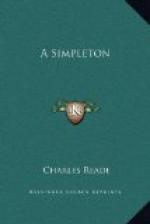“Oh! You are there, are you?” said Dick.
“Iss,” said Ucatella. “Tim good boy. Tim found my child.”
“Well,” said Dick, “he has chosen a nice place. This is the clump the last lion came out of, at least they say so. For my part, I never saw an African lion; Falcon says they’ve all took ship, and gone to England. However, I shall stay here with my rifle till daybreak. ’Tis tempting Providence to lie down on the skirt of a wood for Lord knows what to jump out on ye unawares.”
Tim was sent home for Hottentots, and Christopher was carried home, still sleeping, and laid on his own bed.
He slept twenty-four hours more, and, when he was fairly awake, a sort of mist seemed to clear away in places, and he remembered things at random. He remembered being at sea on the raft with the dead body; that picture was quite vivid to him. He remembered, too, being in the hospital, and meeting Phoebe, and every succeeding incident; but as respected the more distant past, he could not recall it by any effort of his will. His mind could only go into that remoter past by material stepping-stones; and what stepping-stones he had about him here led him back to general knowledge, but not to his private history.
In this condition he puzzled them all strangely at the farm; his mind was alternately so clear and so obscure. He would chat with Phoebe, and sometimes give her a good practical hint; but the next moment, helpless for want of memory, that great faculty without which judgment cannot act, having no material.
After some days of this, he had another great sleep. It brought him back the distant past in chapters. His wedding-day. His wife’s face and dress upon that day. His parting with her: his whole voyage out: but, strange to say, it swept away one-half of that which he had recovered at his last sleep, and he no longer remembered clearly how he came to be at Dale’s Kloof.
Thus his mind might be compared to one climbing a slippery place, who gains a foot or two, then slips back; but on the whole gains more than he loses.
He took a great liking to Falcon. That gentleman had the art of pleasing, and the tact never to offend.
Falcon affected to treat the poor soul’s want of memory as a common infirmity; pretended he was himself very often troubled in the same way, and advised him to read the newspapers. “My good wife,” said he, “has brought me a whole file of the Cape Gazette. I’d read them if I was you. The deuce is in it, if you don’t rake up something or other.”
Christopher thanked him warmly for this: he got the papers to his own little room, and had always one or two in his pocket for reading. At first he found a good many hard words that puzzled him; and he borrowed a pencil of Phoebe, and noted them down. Strange to say, the words that puzzled him were always common words, that his unaccountable memory had forgotten: a hard word, he was sure to remember that.




